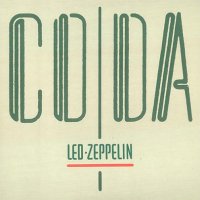
LED ZEPPELIN
Coda
![]()
Swan Song (1982)
Rating: 8/10

|
With In Through The Out Door (1979) being the last Led Zeppelin album proper – the band dissolving in 1980 after the death of drummer John Bonham – 1982’s Coda is merely 33 minutes of outtakes, unreleased tracks etc., spanning the band’s 12-year career.
Coda, despite showcasing a batch of decent songs, was released to fulfil a contractual obligation, and could best be described as a scatty affair that features a couple of edited live cover versions from 1970; a rendition of the Willie Dixon penned Otis Rush song ‘I Can’t Quit You Baby’, and the shuffling funk opener ‘We’re Gonna Groove’, which is Zeppelin’s interpretation of the Ben E. King / James A. Bethea composed ‘Groovin’’ – complete with Jimmy Page’s jangly guitar strut.
Elsewhere, ‘Poor Tom’ is a brisk ditty, while my favourite track, ‘Walter’s Walk’, features an avalanche of John Bonham drums and Robert Plant’s orgasmic yawns over a swaggering Page guitar lick that once again exudes funk.
For the most part however, Coda is a patchy affair at best; a record of peaks and troughs for the collectors. For example, ‘Ozone Baby’ is an infectious little number which shouldn’t have been left off the previous record, In Through The Out Door, while the five-minute ‘Darlene’ with its zippy piano is another bluesy affair with a sleazy vocal croon. However, Bonham’s drum solo, in the form of ‘Bonzo’s Montreux’, is a four-minute curio at best, a tribute to the great man.
Coda closes with the Page and Plant composition ‘Wearing And Tearing’, a driving number featuring a galloping drum assault and fuzzy Page riff which builds with haste. Again, it’s another decent track that was omitted from the In Through The Out Door opus, and this time, rightly so, as it never really goes anywhere despite Plant’s hoarse sneer and the clanking musicianship.
Strangely, despite its flaws, Coda is more rewarding than Presence (1976), mainly due to the fact that it doesn’t rely on over-elaborate folky passages or downbeat blues explosions, these off-cuts tending to opt for more buzzing boogie rather than melancholic meandering. It’s a record I rarely play and yet appreciate it for what it is; the final word in the career of what was once the world’s biggest rock band.
While some may not see Coda as a fitting end, it’s a record that suggests the band had no more to offer; Page, Plant and bassist John Paul Jones clearly scraping the barrel in search of any long lost gems or unreleased tracks to please the fans. With the punk explosion poisoning the minds of the youth, it seemed that any further Led Zeppelin albums may well have seemed out of time, especially lacking that Bonham drum sound, but Coda, despite being a sum of parts, is better than most bands’ studio albums.
Neil Arnold
<< Back to LED ZEPPELIN Articles
Related Posts via Categories
- LED ZEPPELIN – In Through The Out Door (1979) | Album / EP Reviews @ Metal Forces Magazine
- LED ZEPPELIN – Presence (1976) | Album / EP Reviews @ Metal Forces Magazine
- LED ZEPPELIN – Physical Graffiti (1975) | Album / EP Reviews @ Metal Forces Magazine
- LED ZEPPELIN – Houses Of The Holy (1973) | Album / EP Reviews @ Metal Forces Magazine
- LED ZEPPELIN – Led Zeppelin IV (1971) | Album / EP Reviews @ Metal Forces Magazine
- LED ZEPPELIN – Led Zeppelin III (1970) | Album / EP Reviews @ Metal Forces Magazine
- LED ZEPPELIN – Led Zeppelin II (1969) | Album / EP Reviews @ Metal Forces Magazine
- LED ZEPPELIN – Led Zeppelin (1969) | Album / EP Reviews @ Metal Forces Magazine
|
|





